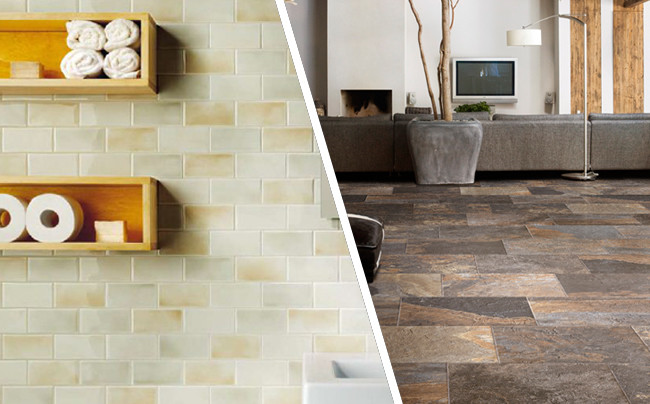Difference Between Ceramic and Porcelain Tile

CERAMIC VS PORCELAIN - WHAT IS THE DIFFERENCE?
Ceramic tile and porcelain tiles differ in their manufacturing methods. Unlike ceramic tiles, porcelain tiles are made from ceramic mixed and fired in a kiln but are prepared from more refined clay heated higher. This makes it much denser and more durable than ceramic tile.
What Is Ceramic Tile?
Usually, ceramic tiles are created by mixing clay with minerals and water. It is typically fired at 1,800-2,000°F and has water absorption of 0.5%-3.0%, with some even reaching 20%
What Is Porcelain Tile?
In contrast, porcelain tiles are made from clay, sand, and feldspar. Granite contains Feldspar, a naturally occurring mineral.
Sand strengthens the mix while feldspar melts, fusing all materials and making the tile denser than standard ceramic tile, thus making it more robust and stain resistant. Ceramic tile will be fired at an average temperature of up to 2,300°F. Higher firing temperatures will drive out more water, and feldspar melting will make the tile impervious to water.
The difference is in the body.
Ceramic glazes can be used in both cases, but the difference is in the body. Both unglazed and glazed porcelains are available.
The PEI rating refers to the hardness of the glaze or surface of the tile, not whether it is porcelain or ceramic.
Ceramic tile is traditionally described as virtually impervious regarding its water absorption. This means porcelain tile absorbs equal to or less than 0.5% water.
Do porcelain body tiles offer any advantages?
This is due to greater body strength and less chance of cracking.
The porcelain surface is ideal for outdoor use because of the resistance to freeze and thaw.
An expansion and contraction can occur with porcelain flooring tiles.
Cost
Ceramic tiles are more cost-effective than porcelain.
Generally, a square white tile is $24.00 / m2, while porcelain will set you back $35.00 / man. Be aware of this if you do not want your house to be tipped to defraud you.
Density & Durability
Ceramic tiles are denser than porcelain tiles, making them less porous. Better than water, they are harder, therefore more durable, and absorb less water. They are therefore more suited to areas where heavy rainfall will occur.
However, this does not mean ceramic isn't equally good. It is less dense, less porous, and easier to work with. Make life easier by using ceramic.